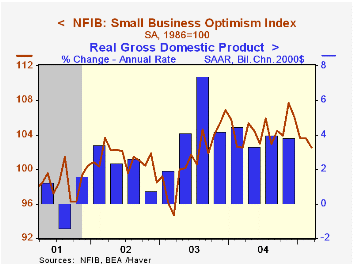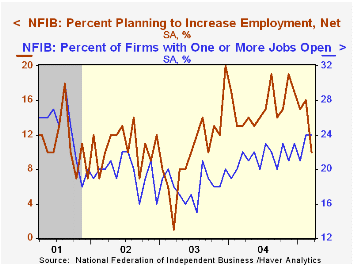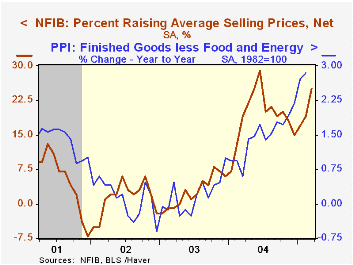 Global| Apr 12 2005
Global| Apr 12 2005Small Business Optimism Extended Decline, Pricing Up
by:Tom Moeller
|in:Economy in Brief
Summary
The March Small Business Optimism Index reported by the National Federation of Independent Business (NFIB) fell 1.1% from February and is down 4.8% from the peak last November. The percentage of firms expecting the economy to improve [...]

The March Small Business Optimism Index reported by the National Federation of Independent Business (NFIB) fell 1.1% from February and is down 4.8% from the peak last November. The percentage of firms expecting the economy to improve fell to 16% versus 47% in November.
During the last ten years there has been a 64% correlation between the level of the NFIB index and the two quarter change in real GDP.
The percentage of firms raising average selling prices jumped to 25%.
The percentage of firms planning to raise employment fell to 10% though the percentage of firms with one or more job openings held steady at 24%, the highest level since 2001. During the last ten years there has been a 67% correlation between these hiring plans and the three month growth in nonfarm payrolls.
The percentage of firms planning to raise capital spending improved to 36% and continued a recent trend of improvement.
About 24 million businesses exist in the United States. Small business creates 80% of all new jobs in America.

| Nat'l Federation of Independent Business | Mar | Feb | Y/Y | 2004 | 2003 | 2002 |
|---|---|---|---|---|---|---|
| Small Business Optimism Index (1986=100) | 102.5 | 103.6 | 0.0% | 104.6 | 101.3 | 101.2 |
Tom Moeller
AuthorMore in Author Profile »Prior to joining Haver Analytics in 2000, Mr. Moeller worked as the Economist at Chancellor Capital Management from 1985 to 1999. There, he developed comprehensive economic forecasts and interpreted economic data for equity and fixed income portfolio managers. Also at Chancellor, Mr. Moeller worked as an equity analyst and was responsible for researching and rating companies in the economically sensitive automobile and housing industries for investment in Chancellor’s equity portfolio. Prior to joining Chancellor, Mr. Moeller was an Economist at Citibank from 1979 to 1984. He also analyzed pricing behavior in the metals industry for the Council on Wage and Price Stability in Washington, D.C. In 1999, Mr. Moeller received the award for most accurate forecast from the Forecasters' Club of New York. From 1990 to 1992 he was President of the New York Association for Business Economists. Mr. Moeller earned an M.B.A. in Finance from Fordham University, where he graduated in 1987. He holds a Bachelor of Arts in Economics from George Washington University.
More Economy in Brief
 Global| Feb 05 2026
Global| Feb 05 2026Charts of the Week: Balanced Policy, Resilient Data and AI Narratives
by:Andrew Cates






